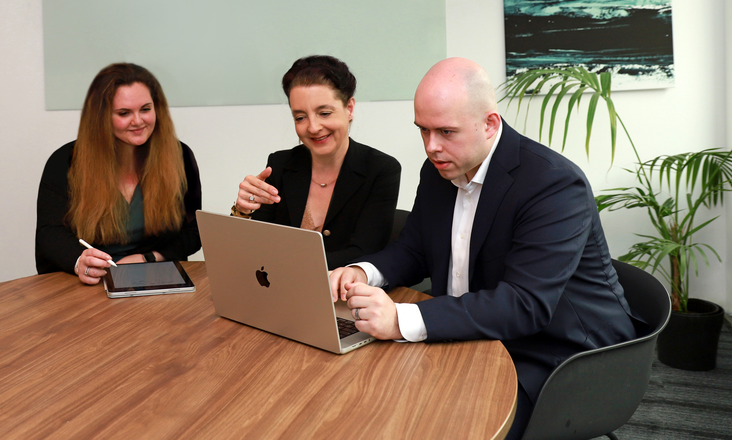Expert Advice: The Basics of Teamwork
Feb 2, 2024 by Vreny Blanco · 8 min read · Interviews, Teamwork

In any dynamic work environment, building and maintaining a high-functioning team is critical to success. Teams face a variety of challenges, from communication issues to conflict resolution, that need to be addressed proactively.
To get perspectives and tips on teamwork and team development, I spoke again with health and rehabilitation psychologist Dr. Veneta Slavchova. In our last interview, Dr. Slavchova explained the signs of burnout and gave valuable tips on how to prevent burnout and strengthen professional resilience.
Today, we will discuss the most important aspects of team development. This edition of Ask the Expert offers you valuable insights on how to motivate and encourage your team, increase productivity, and create a work environment where communication thrives, conflicts are resolved constructively, and each member of your team feels motivated and valued.
What is Team Development?
The desire for harmonious and effective teams is widespread among managers, employers, and HR professionals. Unfortunately, the reality in many organizations is often different. Interpersonal conflicts, unclear distribution of roles, miscommunication, and diffuse responsibilities can lead to challenging situations. This, in turn, can lead to demotivation of team members, increased stress levels, overload of individual team members, inefficient workflows, and high levels of absenteeism and fluctuation in times of skills shortages.
Special challenges also arise from digitalization, the introduction of hybrid work models with alternating home and office work, and increased collaboration in interdisciplinary teams.
As a health and rehabilitation psychologist, I often observe that dysfunctional teams tend to have high rates of absenteeism. In other words, the problematic work environment is not only a waste of resources but can also lead to illness. Targeted team development can help here – this is part of ASK Consulting’s service portfolio.
Against this background, team development is a process in which a group of people in a work context collaborate in order to get along better, work more efficiently, and achieve better results. The aim is to strengthen relationships within the team, improve communication, resolve conflicts, and ensure that every team member can give their best.
For our consulting practice, this means that team development always needs a reason, a goal, and a result. Team development is, therefore, never an end in itself but is tailored to the individual needs of the company. At ASK Consulting, we place great emphasis on taking a close look at what the team actually needs.

What factors influence the development of an effective team?
When we accompany a new team, we pay attention to various aspects that can create an effective and harmonious work team. Our checklist includes whether clear goals have been defined, tasks are clearly established, whether communication within the team works well, and whether team members communicate well with each other and trust each other. This includes, for example, the extent to which clear roles and responsibilities have been defined – is the leadership well-positioned? And: How are the different perspectives and skills in the team handled? Is there an appropriate culture of conflict and error? Can the team react flexibly and adaptably to new challenges in everyday working life?
All these are concrete starting points to achieve positive changes in the context of team development. Depending on the need, we then conduct workshops, for example, to improve communication between team members.
How can the communication within a team be improved?
There can be many reasons for communication problems in teams. In our consulting practice, we first examine whether the structures or the team members are the cause of poor communication.
From a systemic perspective, for example, unclear team structures can be a hurdle. It is terrible if, for example, it is not clearly defined what the work processes look like (lack of standardization) and which interfaces or agreements in the team are important in order to be able to solve the tasks effectively. If this is the case, the structures need to be optimized.
Sometimes, however, team members also have deadlocked communication structures. A classic problem is that a real “email battle” breaks out over an issue that is actually easy to clarify. We have found that a face-to-face meeting can bring faster and more effective clarification because it is simply easier to understand the other person and there is less potential for misunderstandings.
At ASK Consulting, we also offer training in social skills in the workplace for companies. We are all more or less socially competent in different social contexts. Therefore, all teams can benefit from working on their social skills. For example, it helps those affected to realize once again how best to achieve their goals in different social situations in a way that is most comprehensible to the other person.
In your opinion, what are the most important benefits of a well-functioning team?
Well-functioning teams can benefit from numerous advantages. The topic of teamwork is well-researched scientifically, and there are numerous studies that name various advantages, including:
- Effective collaboration
- More creativity
- Increased efficiency and more effective processes
- Lower error rate and reliable task completion
- Fewer misunderstandings in teams (especially in interdisciplinary teams)
- Higher motivation of the group and the individual
- Utilization of synergy effects (“The whole is more than the sum of its parts”)
- Creation of productive learning environments
- Positive work environments
- Less absenteeism, less fluctuation, and long-term employment relationships
In my opinion, it is, therefore, worth investing in team development in order to enjoy these numerous benefits.

What strategies do you recommend to effectively motivate a team?
The leader of the team has a very important key role to play. If the manager takes a motivating and stress-resistant approach, this is the best breeding ground for a satisfied and happy team. However, this presupposes that the manager has sufficient psychological resilience or professional resilience. Resilience can also be increased in a targeted manner – for this, we offer resilience mentoring for (junior) managers.
Strategically, managers can, for example, schedule regular team meetings in which team structures and the current mood are discussed. In this way, the team realizes that there is a conscious space in which they can discuss team dynamics. These meetings should always focus on one key question: What went well in the team, and what can go better? It is important that the results of such meetings actually have consequences. There is nothing more demotivating than the realization that such meetings are nothing more than hot air.
If the manager takes a motivating and stress-resistant approach, this is the best breeding ground for a satisfied and happy team.
How can the performance of a team be measured and evaluated?
What constitutes good performance in a team depends heavily on the team’s area of responsibility. Possible measures include the number of contracts concluded, customer satisfaction, speed of task processing, fast and error-free product development, and much more.
It is very important to define the team’s performance parameters in advance in a transparent and comprehensible way. Unclear result expectations of teams lead to uncertainty, dissatisfaction and, mistrust.
How can conflicts within a team be recognized and successfully resolved?
The attitude of the manager and the corporate culture are crucial here. If the manager is empathetic and sensitive, they will quickly uncover conflicts. When it comes to conflict management, it is important that the manager acts as a moderator and takes care to maintain a balanced position. The overarching goal should be to identify a constructive and sustainable solution to overcome conflicts. This is definitely not something that can be done in haste or at inopportune times. Problem-solving requires space and time to find a solution together. If the fronts have hardened, it can be helpful to call in an external moderator.
When it comes to conflict management, it is important that the manager acts as a moderator and takes care to maintain a balanced position.
Do you have any advice for the readers?
Harmonious teams are fun and effective. Therefore, conflicts and problems in the team shouldn’t be ignored, but addressed in a targeted manner.

Acknowledgments
We would like to thank Dr. Veneta Slavchova for the informative interview and for the insights into the development of teams that she has shared with us.
Further Reading
For more expert insights, check out our Ask the Expert series.
To learn more about Dr. Slavchova and get more tips, do not forget to read the following articles:


